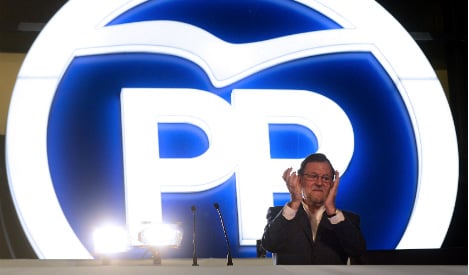Mariano Rajoy will have the first opportunity to try and form a government as his conservative Popular Party won the most seats in the national parliament in Sunday's election.
.jpg)
Source: Interior Ministry / AFP
On January 13th, his candidacy will be put to the vote in the 350-seat congress and he will be sworn in if he is backed by an absolute majority of MPs.
If that fails then a second vote will be held two days later. That second vote would see him requiring more ‘yeses’ than ‘nos’ to be sworn in, meaning that if he can persuade another party to abstain, then he could cling onto power in a minority government.
No natural coalition partners

In the run up to the election there was much speculation over what deals could be struck if no single party won an absolute majority. But the divided vote means that the PP would now be unable to secure a majority coalition even if it did manage to team up with the centrist Ciudadanos.
The same is true of the established socialist PSOE party if it were to join forces with the new anti-austerity party Podemos.
Rajoy won't be sacrificed

Albert Rivera and Mariano Rajoy. Photo: AFP
If the PSOE and Ciudadanos could be persuaded to abstain in the vote of confidence then Rajoy could just about find himself able to take office. But that would mean that the PP would have to negotiate on every single parliamentary measure, and there would be increased likelihood of elections being called early anyway.
But the PP winning support may come at a price for Rajoy. It might be a step too far to expect rival parties to support his candidacy, although might they be persuaded if someone else was in charge?
The perils of an anti-PP pact

Albert Rivera, Pedro Sánchez and Pablo Iglesias. Photo: AFP
If Rajoy fails to secure enough support it will fall to other candidates to try their luck at forming a government.
The most obvious pact would be one uniting the PSOE and Podemos. Both parties share common ground on social policies but with the PSOE forming part of 'la casta' establishment that Podemos has railed so intensely against, it could damage their credibility to enter into a power-sharing arrangement so quickly.
Even if the two parties could strike an agreement, it would not be enough to form government without also getting either Ciudadanos or all the smaller parties – from the United Left grouping to the regional nationalists – on board. The resulting government would constitute a very tricky and unwieldy alliance that would be unlikely to last long.
But if the PSOE and Podemos could also get Ciudadanos on side, then they would easily have enough votes to block the PP from government – if they could agree on a leader.
Whether such a bloc would actually constitute a functioning government is another question. Ciudadanos and Podemos, in particular, might struggle to find common ground.
Old rivalries die hard

Rajoy (PP) and Sánchez (PSOE) Photo: AFP
A German-style grand coalition of the long-established rival parties of the PSOE and PP would be the only two-party partnership to secure a majority government.
But having been at opposite sides of the political spectrum – dividing Spain roughly along the lines of the Spanish Civil War – it is hard to fathom such a teaming up and the alliance would serve to alienate large segments of the PSOE’s base.
What’s more, on Monday morning, the PSOE spokesman Cesar Luena insisted that the party would not back a Rajoy-led regime, seemingly shutting the door to a coalition of the establishment.
Regional independence parties hold the key to Spain

Artur Mas Photo: AFP
It may come down to Rajoy not having a chance at winning a vote without persuading the Catalan and Basque nationalists to support him.
And there lies the huge, and insurmountable stumbling block.
The Catalan Democrácia I Llibertatis is the party of Rajoy’s old adversary Artur Mas, the regional president who put Catalonia on a collision course with Madrid with his drive for Catalan independence.
Oh the irony of having the party that has given Rajoy one of the biggest headaches of his premiership now possibly holding the key to Spain's stability.
Would Rajoy be prepared to sacrifice Catalonia to stay in power?
Italian style politics?

Photo: AFP
Spain could be seeing a new round of elections before spring has even sprung if no single candidate manages to garner enough support to win a parliamentary vote. If no government is formed then the elections will have to take place by March 15th.
And even if there is a loose coalition or even a minority government, it may not be stable enough to last the winter melt.
King becomes the ‘kingmaker’

Just as his father King Juan Carlos played a key role in guiding Spain through the transition to democracy, it could be that King Felipe will have to step up to be the guiding force around the negotiating table to break any deadlock. But is he up to the job?


 Please whitelist us to continue reading.
Please whitelist us to continue reading.
Member comments